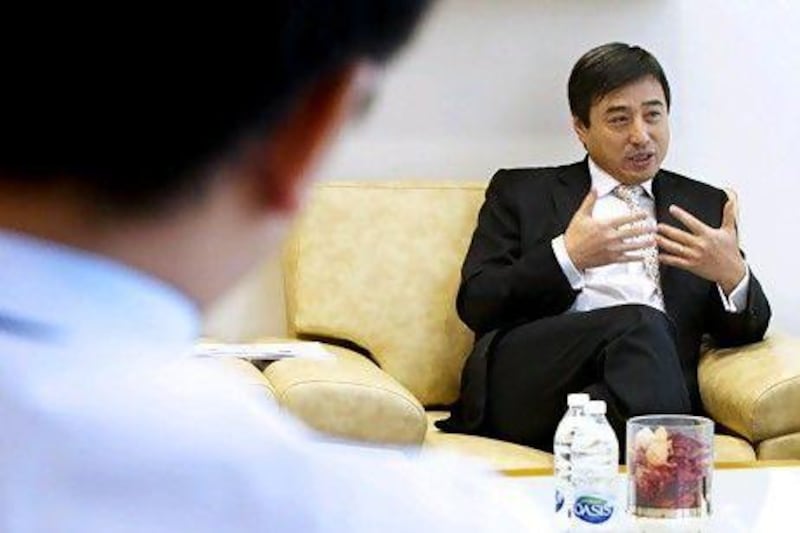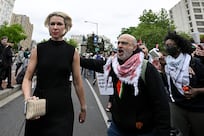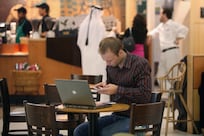By virtually any benchmark you choose - market capitalisation, profits, assets and deposits - Industrial and Commercial Bank of China (ICBC) is the largest bank in the world. Tian Zhiping is the chief executive of its Middle East regional division. Here, he talks about the bank's ambitions in the region, the prospects for the Chinese economy and what his compatriots think about bankers.
How did ICBC come to set up a subsidiary in Dubai?
We've been here five years now. We were the first Chinese bank to set up in the region and we did a lot of research and evaluation before we took the decision. The important thing about the UAE was its stability and safety. We found that it is one of the safest places in the world and that's one of the reasons we're here.
There has been much talk for years about the new Silk Road. For ICBC, is it a reality or a just a slogan?
For us it is a reality. We are building new businesses along this road. Trading goes from China, through the Middle East and through to Africa, which we regard as very important. Just go to DragonMart [a Chinese trading complex on the outskirts of Dubai] and you will see the new Silk Road working.
What, specifically, do you see as the opportunities here?
As a wholesale bank, we see lots of opportunities in supporting Chinese companies here, across all industrial and commercial sectors. We are very interested in telecoms and other high-tech areas and in civil engineering, construction and real estate. The energy sector is small but we hope to grow that. But all trade-related businesses are interesting for us. Chinese clients will probably remain our biggest market but others will come. We don't choose on grounds of nationality.
Explain to me the scope of ICBC's businesses in the region.
Dubai is our main subsidiary, registered with the Dubai International Financial Centre. Then we have branches in Abu Dhabi and Qatar. We are very interested in Saudi Arabia and Kuwait and have applied for licences in both those countries.
What about retail banking?
We want to provide services to retail customers and we are awaiting approval from the authorities. I don't believe the region is over-banked. There are more than 200,000 Chinese nationals in the UAE and they ask us why we cannot provide retail services. Also, the growing tourist trade with China needs a retail bank presence here. We are awaiting approval from the UAE Central Bank and I hope it will come soon. We have shown with wholesale banking that we are a well-run business.
Investment banking is having a hard time in the region. What are your thoughts?
We have a flagship investment banking operation in Hong Kong and we want to expand that. We want to be able to give advisory services to clients, introduce Chinese businessmen to the Middle East and vice versa. Also, of course, trading in yuan, which is a very big topic. Many people round the world would like to trade more in yuan and I'm sure it will be popular here, too. If we can supply yuan to clients in the [Arabian] Gulf it will be a very important profit source.
Do the Chinese authorities have to free up yuan trading more if it is to become a real world currency?
Yes, there is a long way to go and the authorities should go further but it has to be step by step. We cannot do it all at once. Trade settlement in yuan will come first but it is an inevitable process that the yuan will become internationalised.
What is ICBC's attitude to foreign investors?
The investment authorities in Kuwait and Qatar bought stakes in our IPO in 2006. I don't believe UAE bodies took stakes then but individuals may have invested. We welcome investors and we are open for international investment via Hong Kong.
Would you consider buying stakes in big local banks?
Our strategy is to develop our business organically but we would take the opportunity if there was somebody we thought would be a good partner, at the right price.
The Chinese economy has been the main driver for global economic growth for the past few years. Can this continue, or will we see a "hard landing" in China?
This is the big question. A senior government man in the UAE asked me recently if I thought Chinese growth might fall to 5 or even 3 per cent, and I told him: 'No, we have no big problems in our economy.' For 30 years we have averaged 9.7 per cent growth per year, so if it is 7.5 this year it is just an adjustment. China is such a huge market and huge manufacturer. Even if Europe declines we can find other markets, like Africa.
But how do you persuade Chinese consumers to spend more?
My parents' generation were careful and thrifty, mine is willing to spend more on a house or a car, for example. The next generation will spend even more. For example, you see how the big luxury companies are doing a lot of business in China. This will keep growing.
After 30 years of economic reform and growth, do you believe China is still a communist country?
An Arab friend asked me this recently. I said, 'We're here to make money, if you want to talk about politics, let's do it somewhere else.' The Chinese people still have their beliefs but they also want to get on in the world.
Banks have a bad reputation in the West. What do Chinese people think of bankers?
Historically, the banks were not liked because they were being run for rich people, not for the poor. But Chinese banks didn't make trouble during the financial crisis. We worked in harmony to support the people, not like in the West. Now Chinese people see they need banks.
twitter: Follow and share our breaking business news. Follow us
iPad users can read the digital edition of business section as it was printed via our e-reader app. Click here





